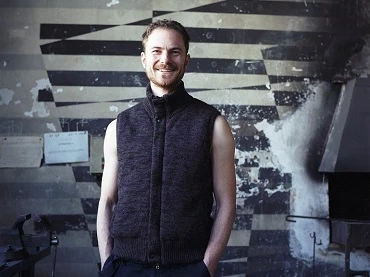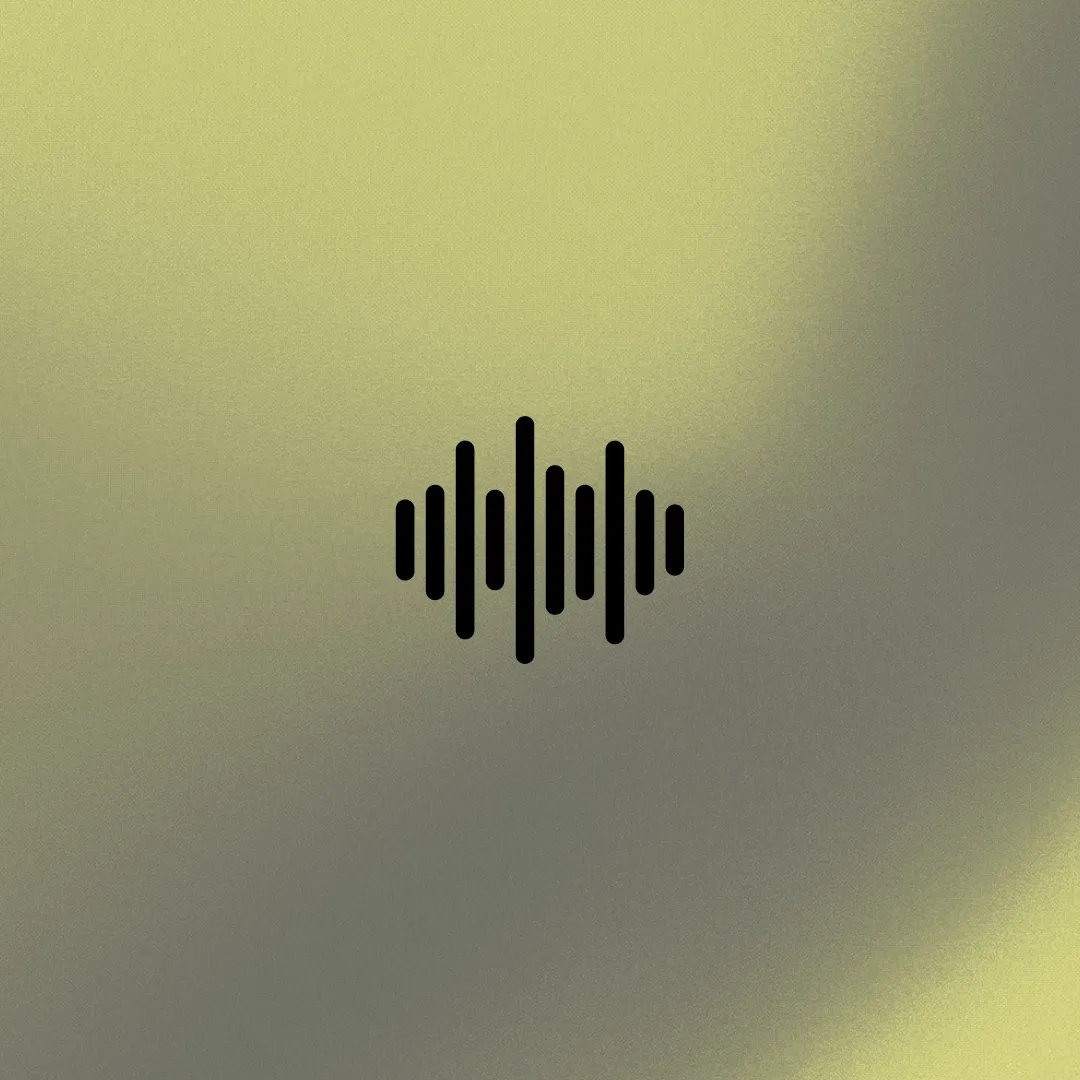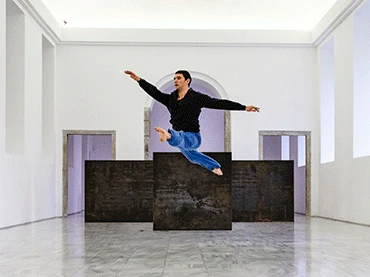
Held on 17 Dec 2016
Museo Reina Sofía presents 20 Dancers for the XX Century by the French choreographer and incumbent director of the Musée de la danse, Boris Charmatz. The piece will feature the participation of twenty dancers and performers and will be executed across different gallery spaces housing the Museo’s Collection.
20 Dancers for the XX Century is conceived as a living archive in which twenty dancers from different generations perform, recall, appropriate, explain and transmit extracts from a selection of 20th-century dance solos, originally created and performed by pre-eminent figures from the discipline. Each dancer will put forward their own “museum”, freely interacting with diverse spaces in the Collection, and the piece sees Charmatz explore and expand upon the notion of the museum as a living institution with room for dance practices.
Paraphrasing Boris Charmatz, the project, more than an inheritance, encompasses a kind of archaeology: it seeks to elicit past gestures, restored gestures, reinterpreted by the dancer’s body in the present. From a metaphorical and literal perspective, a dance museum’s collection resides in dancers’ bodies; the body is the most operative storage space: formed by gestures and inhabited by memories which are ready to be activated, in the present and future. The dancers, artists and actors participating in this piece are free to choose and remember, to teach, speak, repeat, reproduce and reappropriate the solos of their choice. Their knowledge of particular works could hail from education or could have been performed previously, while their exercises could adopt the form of wild appropriation or respectful homage, of a division, text, or the reading of documents. The solos are shown where the dancers feel they should be shown and are presented and embodied, but without being allocated a place or time. In this way, emphasis is placed on the mobility and fluidity of bodies: there is no programme to follow, no schedule to adhere to; no one knows exactly who will present what, or where or when. However, everyone is invited to discuss, talk, question and comment.
The activity will be held alongside an encounter with the choreographer, to take place on Tuesday 13 December inside the Nouvel Building’s Auditorium 400
The projects of Boris Charmatz (Chambéry, France, 1973) focus on investigating, rethinking and developing dance from different perspectives. Internationally renowned for his experimental creations, Charmatz’s works have featured at major international festivals and in museums like MoMA, New York. He was also recently the subject of a programme at Tate Modern and Sadler’s Wells, in London, which explored at once his strongest elements of choreography and performance. After passing through Les Champs Libres (Rennes, 2012); MoMA (New York, 2013); the Foreign Affairs Festival (Berlin, 2014); Tate Modern (London, 2015), and Palais Garnier (Paris, 2015), 20 Dancers for the XX Century arrives at the Museo Reina Sofía to coincide with the participation of the Musée de la danse at the Madrid Community’s XXXIV Autumn to Spring Festival with the piece manger (Wednesday, December 14 and Thursday, December 15 at 8:oo p.m. in the Teatros del Canal). Both works are presented within the framework of a two-fold programme which provides audiences with a sharper focus on the figure of the choreographer through different perspectives.
Organised by
Museo Reina Sofía in collaboration with Comunidad de Madrid
In collaboration with
Participants
A project by
Boris Charmatz / Musée de la danse
Dancers
Boglárka Börcsök, Magali Caillet-Gajan, François Chaignaud, Ashley Chen, Raphaëlle Delaunay, Olga Dukhovnaya, Antonia Franceschi, Latifa Laâbissi, La Ribot, Mark Lorimer, Filipe Lourenço, Vera Mantero, Fabrice Mazliah, Mani Mungai, Olga Pericet, Sonja Pregrad, Marlène Saldana, Frédéric Seguette, Frank Willens and Thomas Wodianka.
* cast susceptible of changes
General stage manager
Mathieu Morel
Direction of productions
Martina Hochmuth with the collaboration of the Musée de la danse team
Project produced by
Musée de la danse / Centre chorégraphique national de Rennes et de Bretagne, directed by Boris Charmatz. The association is subsidised by the Ministry of Culture and Communication (the Regional Department of Cultural Affairs / Bretagne), the city of Rennes, the Regional Council of Brittany and the Ille-et-Vilaine General Council. The Institut Français also regularly supports international tours by the Musée de la danse.
Thanks to
Vito Acconci, Jerôme Bel, Anne Teresa De Keersmaeker, Esther Ferrer, William Forsythe, Sanja Iveković, Eszter Salamon, Meg Stuart, The Mike Kelley Foundation for the Arts, The George Balanchine Trust.
Choreography by Merce Cunningham © The Merce Cunningham Trust. Merce Cunningham’s choreography is performed by Mr Ashley Chen with the permission and support of the Merce Cunningham Trust. All rights reserved.
Marco Antonio Álvarez Fernández, Laura Andreu Sedeño, Elisa Angelina Antunes, Matías Daporta González, Ana Isabel Guzmán Morales, Irene Holguín Gómez, Anastasiia Lauhina, Helena Llorente de Carli, Ana Martín García, Nicole Pérez Rapp, Daniel Raventós Puchol, Marta Salas Lozano and Clara Santiago Beato.

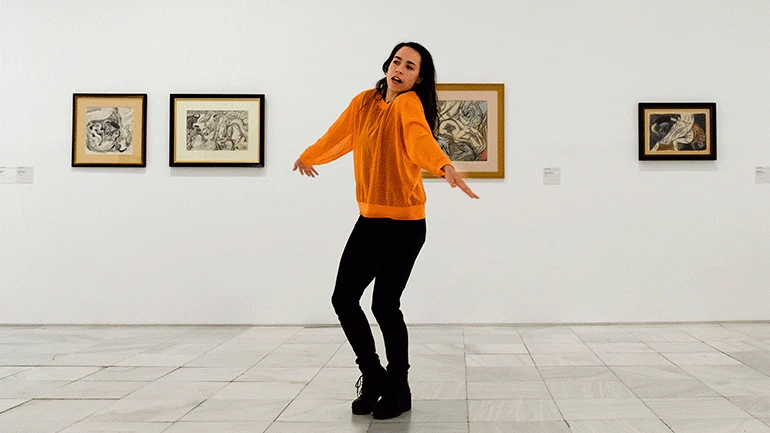
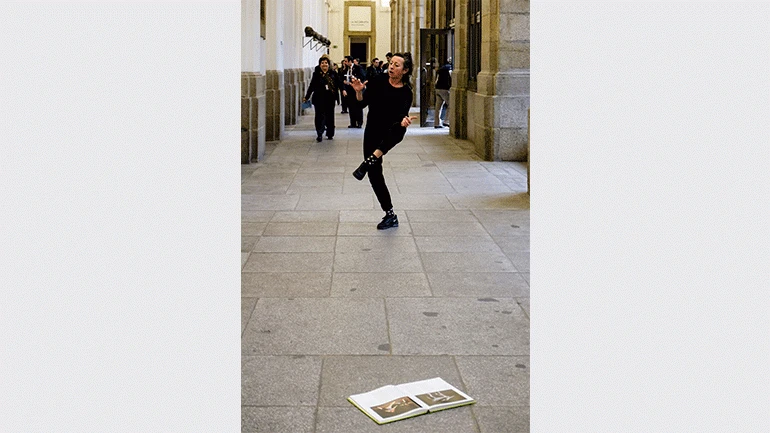
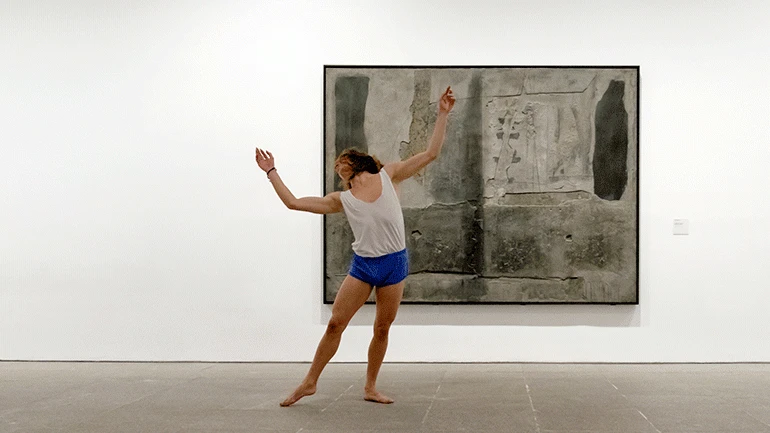
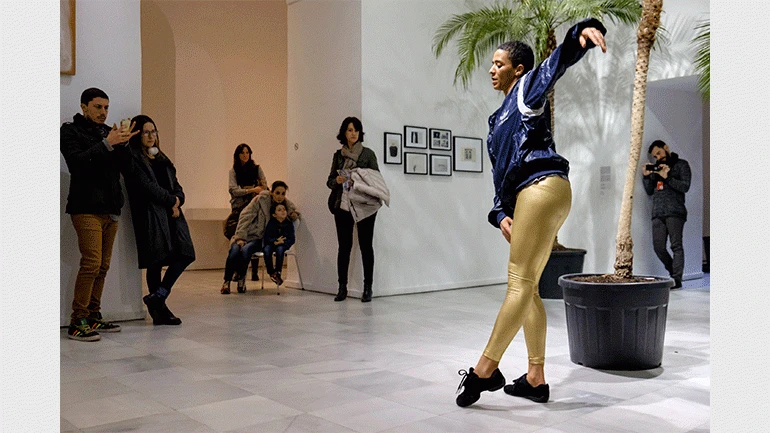
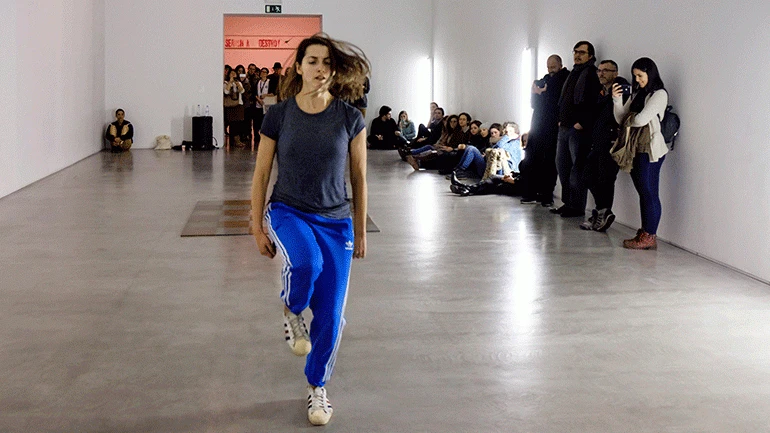
Más actividades

Difficulty. Forms and Political Effects of Deviation in Writing and Contemporary Art
23 February – 14 December 2026 – Check programme
Difficulty. Forms and Political Effects of Deviation in Writing and Contemporary Art is a study group aligned towards thinking about how certain contemporary artistic and cultural practices resist the referentiality that dominates the logics of production and the consumption of present-day art. At the centre of this proposal are the concepts of difficulty and deviation, under which it brings together any procedure capable of preventing artistic forms from being absorbed by a meaning that appears previous to and independent from its expression. By ensuring the perceptibility of their languages, difficulty invites us to think of meaning as the effect of a signifying tension; that is, as a productive and creative activity which, from the materiality of art objects, frees aesthetic experience from the representational mandate and those who participate in it from the passiveness associated with tasks of mimesis and decoding.
The economy of the referential norm translates the social logic of capitalism, where insidious forms of capturing subjectivity and meaning operate. In the early 1980s, and adopting a Marxist framework, poet Ron Silliman highlighted how this logic entailed separating language from any mark, gesture, script, form or syntax that might link it to the conditions of its production, rendering it fetichised (as if without a subject) and alienating its users in a use for which they are not responsible. This double dispossession encodes the political strategy of referential objectivity: with no subject and no trace of its own consistency, language is merely an object, that reality in which it disappears.
The political uses of referentiality, more sophisticated today than ever before, sustain the neoliberal-extractivist phase of capitalism that crosses through present-day societies politically, economically and aesthetically. Against them, fugitive artistic practices emerge which, drawing from Black and Queer studies and other subaltern critical positions, reject the objective limits of what exists, invent forms to name what lies outside what has already been named, and return to subjects the capacity to participate in processes of emission and interpretation.
Read from the standpoint of artistic work, the objective capture of referentiality may be called transparency. Viewed from a social contract that reproduces inequality in fixed identity positions, transparent in this objectivity are, precisely, the discourses that maintain the status quo of domination. Opposite the inferno of these discourses, this group aims to collectively explore, through deviant or fugitive works, the paradise of language that Monique Wittig encountered in the estranged practices of literature. For the political potency of difficulty — that is, its contribution to the utopia of a free language among equals — depends on making visible, first, its own deviations; from there, the norm that those deviations transgress; and finally, the narrowness of a norm which in no way exhausts the possibilities ofsaying, signifying, referring and producing a world.
From this denouncement of referential alienation, fetishisation and capture, Difficulty. Forms and Political Effects of Deviation in Writing and Contemporary Art turns its attention to the strategies of resistance deployed by contemporary artists and poets. Its interest is directed towards proposals as evidently difficult or evasive as those of Gertrude Stein, Lyn Hejinian, Theresa Hak Kyung Cha, Kameelah Janan Rasheed, Kathy Acker, María Salgado and Ricardo Carreira, and as seemingly simple as those of Fernanda Laguna, Felix Gonzalez Torres and Cecilia Vicuña, among other examples that can be added according to the desires and dynamics of the group.
The ten study group sessions, held between February and December, combine theoretical seminars, work with artworks from the Museo Reina Sofía’s Collections and exhibitions, reading workshops and public programs. All these formats serve as spaces of encounter to think commonly about certain problems of poetics — that is, certain political questions — of contemporary writing and art.
Difficulty. Forms and Political Effects of Deviation in Writing and Contemporary Art inaugurates the research line Goodbye, Representation, through which the Museo Reina Sofía’s Studies Directorship seeks to explore the emergence of contemporary artistic and cultural practices which move away from representation as a dominant aesthetic-political strategy and redirect their attention toward artistic languages that question the tendency to point, name and fix, advocating instead for fugitive aesthetics. Over its three-year duration, this research line materializes in study groups, seminars, screenings and other forms of public programming.

CLINIC 2628. A Community of Writing and Research in the Arts
February – October 2026
Clinic 2628 is a project which supports and brings together writings which stem from the intention to offer a space and sustainable time for research work in art and culture. Framed within an academic context which is increasingly less receptive to the forms in which thinking happens and is expressed, the aim is to rescue the academic from its neoliberal trappings and thus recover the alliance between precision and intuition, work and desire. A further goal is to return writing to a commons which makes this possible through the monitoring of processes and the collectivisation of ideas, stances, references and strategies.
The endeavour, rooted in a collaboration between the Museo Reina Sofía’s Studies Directorship and the Artea research group, via the i+D Experimenta project, is shaped by three annual editions conceived as spaces of experimentation, discussion and a demonstration of writings critical of what is put forward by today’s academia.
What forces, forms and processes are at play when writing about art and aesthetics? In academia, in museums and in other cultural institutions, the practice of writing is traversed by productivist logics which jeopardise rhythms of research and experimentation. The imposition of both scientism inherent in the structure of “the paper” and the quantifying of results which demand a criterion of quality and visibility sterilise and smoothen, from the outset, the coarseness that is particular to writing understood from the concrete part of language: phonic, graphic, syntactic and grammatical resistance connecting the language user to the community the language unites and activates. They also sterilise the roughness enmeshed in the same desire to write, the intuitive, clear and confusing pathways that once again connect the writer to those reading and writing, participating in a common good that is at once discovered and produced.
The progressive commercialisation of knowledge propelled by cognitive capitalism moves further away from the research and production of knowledge in artworks and artistic languages and practices. The work of curators and archive, criticism, performances and essays formerly saw a horizon of formal and emotional possibilities, of imagination that was much broader when not developed in circumstances of competition, indexing and impact. Today, would it be possible to regain, critically not nostalgically, these ways; namely, recovering by forms, and by written forms, the proximity between art thinking and its objects? How to write in another way, to another rhythm, with no more demands than those with which an artwork moves towards different ways of seeing, reading and being in the world?

Cultural Work
Thursday, 12 February 2026 – 5:30pm
This series is organised by equipoMotor, a group of teenagers, young people and older people who have participated in the Museo Reina Sofía’s previous community education projects, and is structured around four themed blocks that pivot on the monstrous.
Session number two looks to approach film as a place from which cultural work is made visible and processes of production engage in dialogue with artistic creation. From this premise, the session focuses on exploring how audiovisual content is produced, assembled and distributed, from the hands that handle the images to the bodies that participate in its circulation. The aim is to reflect on the invisible effort, precarity and forms of collaboration that uphold cultural life, that transform the filmic experience into an act that recognises and cares for common work.

Alberto Greco. Viva el arte vivo
Tuesday, 10 February 2026 – 7pm
In conjunction with the opening of the exhibition Alberto Greco. Viva el arte vivo, Fernando Davis, the show’s curator, and Amanda de la Garza, the Museo Reina Sofía’s deputy artist director, will converse in the Nouvel Building’s Auditorium 400 on the life and work of the Argentinian artist, a core figure in experimental avant-garde art.
The title of both exhibition and conversation originates from the proclamation “Long Live Arte Vivo” Alberto Greco (Buenos Aires, 1931— Barcelona, 1965) disseminated around the streets and on the walls of Rome. For Greco, arte vivo was an art of the future, an art based on a set of irreverent and untimely gestures, of adventures open to unpredictability melding with life, and which began in 1962, prior to his coining of the term “vivo-dito”. In his Manifiesto dito dell´arte vivo (Dito Arte-Vivo Manifesto), which he pasted on the walls of Genoa, Greco encouraged new contact “with the living elements of our reality: movement, time, people, conversations, smells, rumours, places, situations”. He would also burst into the everyday of Madrid’s streets as he convened a “vivo-dito moment”, culminating in the burning of a canvas painted collectively in Madrid’s Lavapiés neighbourhood.
In addition to founding arte vivo, Alberto Greco was an informalist painter, a queer flâneur, a poet and sometime actor. This intense journey of Greco’s life and art is closely connected to the migrant route he embarked upon in 1950 in Buenos Aires, taking in Atacama and Humahuaca, Paris, Rio de Janeiro, São Paulo, Genoa, Rome, Madrid, Piedralaves, New York and Ibiza and ending abruptly in Barcelona, where he took his own life shortly after writing his final great work, the novel Besos brujos (Bewitching Kisses, 1965).
These inaugural conversations, part of the main working strands of the Museo’s Public Programmes Area, aim to explore in greater depth the exhibition narratives of the shows organised by the Museo from the perspective of artists, curators and specialists.
![Basel Abbas y Ruanne Abou-Rahme, At Those Terrifying Frontiers Where the Existence and Disappearance of People Fade Into Each Other [En esas fronteras aterradoras donde la existencia y la desaparición de personas se disuelven entre sí], 2019](https://recursos.museoreinasofia.es/styles/small_landscape/public/Colecci%C3%B3n/abbasabourahme.png.webp)
Gaza and Aestheticide
Tuesday February 10, 2026 – 16:00 h
“This seminar examines the systematic destruction of Palestinian collective sensibility — what we might call ‛aestheticide’ — that has accompanied Israel’s genocide and ecocide in Gaza, and considers the conditions of artistic practice in its aftermath. Over more than two years, the demolition of universities, archives, museums, and libraries has not only erased cultural and intellectual infrastructure but has also targeted the very possibility of representation itself. The destruction of a people has been accompanied by the destruction of their image, their history, and their capacity to be known: reportage, scholarship, and cultural memory have been deliberately undermined, with media institutions, universities, and museums often complicit in this repression. Gaza consequently functions as a rehearsal space for a possible global future — of fascism, post-liberal authoritarianism, militarized borders, and AI-enabled warfare —, a laboratory for an emerging world order. What, then, becomes of critical analysis and resistance under these conditions? And what becomes of aesthetics and politics?”
—T.J. DemosThis seminar takes place thanks to the art historian’s invitation to Spain by the Miró Foundation. In the context of the museum, it engages in dialogue with a broader line of work on the climate emergency and decolonial perspectives developed within the Museum of the Commons project (2023–2026) of the L’Internationale network, of which the Museo Reina Sofía is a member; as well as with some of the questions that animate the study group Aesthetics of Peace and Desertion Tactics. Finally, it is also embedded in a wider strategy of support for and commitment to the artistic and discursive practices of Palestinian artists and cultural practitioners, most clearly reflected in the TEJA network.
